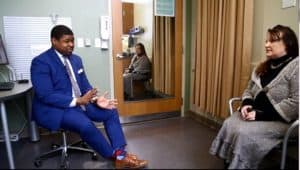
Carye Beavers is always in pain. The 45-year-old has a degenerative bone disease that was made worse by a car accident in 2011.
Before she discovered relief from the UAMS pain management clinic, Beavers says her days usually ended around noon because it hurt too much to function regularly beyond that.
“On a scale of 1 to 10, my day-to-day pain was at an 8,” Beavers said. “By the end of the day, I was in so much pain, I couldn’t function. I was literally in tears in bed without any hope it would get better.”
Beavers soon found a solution at the UAMS Pain Clinic with Johnathan Goree, M.D., an anesthesiologist who specializes in pain management.
Goree says there are several surgical and non-surgical options to treat pain without opioid medication. Beavers receives non-surgical steroid injections.
“The injections reduce inflammation in nerves and in the muscle,” Goree said. “We find the specific area that is inflamed, either joints or nerves, and target it with either x-ray or ultrasound guidance. Then we inject a local anesthetic mixed with a steroid to calm the inflamed area.”
Beavers receives a steroid injection about every six to eight months. A year ago, she moved from Little Rock to Lebanon, Pennsylvania. But she still makes the trip back to Arkansas for her treatment.
“There are no doctors I could find in my area that will do this type of pain management,” Beavers said. “They won’t even discuss it even with the success I’ve had for the past few years.”
Beavers’ latest injection was during Spring Break.
“With Dr. Goree and his team at this clinic, my pain is now at about a 5 or 6,” Beavers said. “For someone who has always been in constant pain, that’s a big deal. That’s a lot of relief.”
Other treatments, Goree says, are nerve ablations and spinal cord stimulation. In ablation, nerves delivering pain signals to the brain are destroyed with either heat, cold or chemicals. Because it’s been damaged, that nerve can no longer send pain signals to the brain.
For spinal cord stimulation, a physician places a device under the patient’s skin that sends electrical signals to the spinal cord. The patient doesn’t feel pain because the electrical pulses mask the pain signal.
For some patients, Goree says they use low-dose methadone because of its long-lasting effects and ability to work on more than one pain receptor.
“Most opioids only work on one receptor,” Goree said. “Eventually, that receptor gets used to the medication and it stops being as effective.”
Goree says low-dose methadone also prevents patients from experiencing peaks and troughs or highs and lows. Since it lasts longer than a drug that works for only a few hours at a time, it keeps the patient at a more steady state.
Methadone is often used to treat patients who have had a previous opioid addiction to prevent withdrawal. Goree emphasizes the medication should only be administered under the care of a trained physician.
Beavers says she appreciates the pain clinic for being open-minded about methods of pain management that fits each individual patient.
“Here, it’s not just a blanket, ‘this is what we do for everyone.’ They care about my life. I’m more than a folder they look at for five minutes before entering the room,” Beavers said. “I feel like they know me and they care. They’re treating me for my future and not just for today, giving me back hope for a quality of life that I had given up on.”
By Katrina Dupins | April 9th, 2018 |
